
In an effort to continuously collaborate with DRC’s laboratories on their accreditation processes, ASCOLAB have worked with DRC’s laboratories to design an internal auditor coaching programme to meet their objectives.
After the completion of training on Internal auditing based on ISO/CEI 17025: 2017 and ISO 19011: 2018 and after learning the procedures, methodologies, and objectives that a high-quality internal audit must meet, the ASCOLAB experts guide delegates through the entire process and teach them exactly how to prepare thoroughly for their new competencies.
The ASCOLAB experts accompany internal auditor candidates’ local laboratories in all key steps of the audit, and assist in defining the scope, performing the risk analysis, formulation of non-conformances, and establishing the provisional plan, conducting the opening and closing meetings, presentation of the non-conformances, and the effectiveness of corrective actions.
ASCOLAB experts check whether they are aligned with the methodology and the auditing standards, and therefore meet all the quality requirements of the profession.
The ASCOLAB goal is to directly transform the laboratory’s first engagement into a success that brings added value to the laboratory organization.
Based on the online and on-site coaching, the objectives of ASCOLAB are:
During 2021, four Internal Auditors of Central Laboratory of Panda GCM/BU/US have been qualified by ASCOLAB.
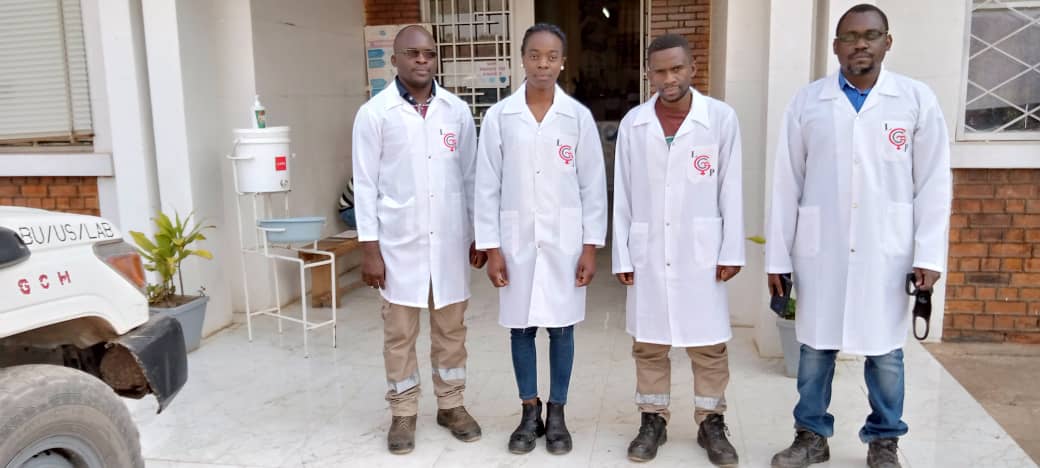

It has been a busy six months for Eurachem, despite the ongoing challenges presented by the pandemic. Travel restrictions meant that once again the General Assembly week and associated workshop in May were virtual events, rather than in Prague as we had hoped. Organised by Eurachem-Czech Republic, the workshop on ‘Trends and challenges in ensuring quality in analytical measurements’ discussed experiences with the revised ISO/IEC 17025:2017 and issues related to ensuring quality in medical laboratories, presented current Eurachem activities in the field of analytical quality assurance, and discussed future challenges from both research and practical perspectives. Copies of the workshop presentations are available on the Eurachem website and recordings are available on our YouTube channel.
Eurachem currently has three events in the diary for 2022 and we hope that those scheduled as face-to-face activities will be able to go ahead as planned:
The Eurachem Working Groups have continued to be active in developing and updating guidance documents. The 2nd edition of the Eurachem/CITAC guide on ‘Use of uncertainty information in compliance assessment’ was published in April. This edition has been amended to take into account the developments in a number of documents including ILAC G8 (Guidelines on decision rules and statements of conformity) and JCGM 106 (Evaluation of measurement data – The role of measurement uncertainty in conformity assessment). The Measurement Uncertainty and Traceability Working Group has also published an updated information leaflet on the use of uncertainty information in compliance assessment to accompany the guide.
The evaluation of uncertainties associated with sampling is an ongoing area of interest for many laboratories. The Sampling Uncertainty Working Group, in collaboration with the Royal Society of Chemistry Analytical Methods Committee (AMC) Sampling Uncertainty Working Group, recently published a new leaflet explaining the concept of the uncertainty factor (https://www.eurachem.org/index.php/publications/leaflets/uncertainty-factor).
Finally, work developing guidance on ‘Assessment of performance and uncertainty in qualitative chemical analysis’ is well advanced with a new guide expected to be published shortly.
In addition to its network of member countries, Eurachem also works through liaisons with stakeholder organisations that share common interests in measurement quality. In recent months the Eurachem Executive has been working to refresh and formalise its relationship with a number of key organisations. The first output of this activity was the signing of a new Memorandum of Understanding with NMKL (Nordic Committee on Food Analysis) on 16 August. The MoU provides a framework for future collaboration, with a view to optimising resources to ensure maximum benefit for both organisations’ members and the wider analytical community.
If you would like to keep up to date with Eurachem activities you can:

Similar to many businesses around the world, the ANAB Training Institute faced unprecedented challenges during early 2020. It seemed like overnight everything stopped and continuing with “normal” training operations was no longer possible. In a matter of days, we went from reaching maximum registrations to having only self-paced training gain any interest. We knew in order to be able to continue offering our training, we had to act and act quickly.
Our team, at that time, had been together for less than a year and were still getting to know one another, fleshing out our roles, responsibilities, and capabilities when everything was turned upside down. Now, we were faced with the challenge of needing to change the mode of instruction and delivery of training for the vast majority of our in-person training course catalog.
We knew one thing – Live Online – was the only way we could continue operating in this new world of quarantine, but how? What system would be best suited for live, instructor-led online instruction? And how would we deliver training in such a way as to maintain ANAB’s long-standing high-quality reputation as a high-quality provider of accreditation related standards and technical training? The internal auditor, and lead and technical assessor courses, which are our most popular, were traditionally done face to face, as these types of courses have a great deal of interaction among the participants and the instructor. We found ourselves asking, is the ‘one approach fits all’ the best way to go or should we take each course and decide how to structure it? How would we overcome the disconnect between trainer and trainee when such interactions are so vital to learning success? What about distractions and overall screen fatigue? And most importantly, how would we keep the participants captivated and involved, and monitor their progress without the typical visual clues one sees in the classroom? We had to answer all these questions in a very short period of time. We were spending days educating ourselves on online systems (e.g., Zoom, WebEx, Go-To-Meeting) and figuring out what would work best for us. All the while, in quarantine and without the ability to be in the same room together, talk about screen fatigue!
We were not successful from day one, our first month of completely online offerings sold very few seats. In addition, we had few instructors with online teaching experience. About two months into the launch of our online training, we finally started to see improved results; we were getting participants and our courses were starting to fill. After our first private training request for an instructor-led online course and with the conversion of all our courses to online delivery, we were confident that this would actually work. Fast forward a year, our operations are back to normal; well, back to the “new” normal. We learned many tricks along the way and are still learning, every session brings something new and continual improvement is constant.
Our current instructor-led online courses are more interactive now than they ever were. We were able to incorporate every in-class exercise to an online exercise and utilize online tools to maximize participant interactivity. In addition, 100% of our in-person course offerings have been transferred to instructor-led live online training. Yes, we even learned that the Internal Auditor, and Lead and Technical Assessor courses can be successfully and effectively delivered live online, using small group exercises, an e-version of flip charts for discussions and debriefs and most importantly various instructor tools and tricks to keep participants engaged. Even our biggest instructor skeptics now happily instruct in this new virtual environment. We may not even be able to convince them to go back on the road! Well, that’s another bridge we can cross when we get there.
We knew then, and are even more convinced now, that this COVID pandemic has changed the way we do business forever. The world is more connected through electronic means now than ever before and it is not necessarily a bad thing. This reality opened-up a tremendous number of opportunities for businesses and individuals. The ANAB Training Institute will never be the same, and we do not want it to be. We are now reaching more participants across the globe than we ever did just short of 2 years ago. We can deliver private and open registration courses to people globally without the expense of travel. The diversity that we are seeing in our open registration courses enriches the experience for all participants. The discussions and exchange of experiences is something we would never have been able to achieve in pre-COVID era.
We hope one day we will be able to go back to face to face training, but for now, our customers are telling us it is not the time. People are not ready, and we are ok with that. Our early 2022 schedule is still fully live online, and although we are open to face-to-face private training, over 90% of our customers request for the instructor-led live online delivery.
Remote everything will pick up momentum and will not go away, whatever the future brings we have it covered.
ANAB Training Institute – We are open for business in this new virtual world.
ANAB Training Institute Team
From top left Amy Levasseur, Emma Dutton, Melanie Ross and Natalia Larrimer. Missing from the photo Roger Muse.

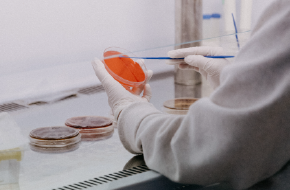
There are four accreditation bodies (ABs) operating in Thailand however, only the National Standardization Council (NSC) – Thai Industrial Standards Institute (TISI) – Ministry of Industry is a full member signatory to both the ILAC MRA and IAF MLA. The Bureau of Laboratory Quality Standards (BLQS-DMSc) – Department of Medical Sciences – Ministry of Public Health, and the Bureau of Laboratory Accreditation (BLA-DSS) – Department of Science Service – Ministry of Higher Education, Science, Research and Innovation hold full membership and signatory status to only the ILAC MRA while the Office of Standard Accreditation (OSA) – National Bureau of Agricultural Commodity and Food Standards (ACFS) – Ministry of Agriculture and Cooperatives holds full membership and signatory status to only the IAF MLA. All of these ABs are Government Agencies working as the agency-in-charge for standardization in a specific field of accreditation (such as testing and calibration laboratories, medical laboratories, reference material producers (RMPs), and product certification programs). Their specific scope of activity relates to the National Standardization Act B.E. 2551 (2008) of the national standard committee under the Cabinet approval.
The implementation of the United Nations Sustainable Development Goals (SDGs), the benefits of the multilateral MRA for greater efficiency, cost savings on the ease of doing business policy, and the ongoing global pandemic of the coronavirus disease 2019 (COVID-19) provide significant opportunity for the Thai Public Policy Government to improve its own performance. A Memorandum of Understanding (MoU) on a single platform for accreditation was signed between the four ABs to strengthen the cooperation on 15th December 2020. This partnership aims to reduce the redundancy and unnecessity of multiple onsite assessments and accreditations from different ABs with specific areas of accreditation activities for customers.
Presently, the unified accreditation reform has commenced with testing laboratory accreditation by using joint assessments between ABs under the ‘single scheme’ of the same standard (i.e. ISO/IEC 17025) and under the ‘multiple schemes’ of different standards (i.e. ISO/IEC 17025 and ISO 15189). Currently a laboratory can apply with only one AB for any scope of testing where that AB has the MRA recognition. For example, currently, a laboratory has to apply for ISO/IEC 17025 testing scope of accreditation with NSC for industrial chemicals; with BLQS-DMSc for pharmaceuticals; and with BLA-DSS for waste water. From now on, the laboratory will be able to apply to just one AB as a single point of contact (“one stop service”), for the entire scope of testing activities, and still be verified compliant with the standard. The platform however, is currently only voluntary, so a customer may maintain accreditation with each individual AB as per usual should they wish.
The next step, is to set up ongoing monitoring and reporting systems that interface with this platform. We look forward to working with the simplified and harmonized processes and procedures of each AB to expand the unified accreditation model., In the future we plan to establish the “one application – one platform – one certificate” for testing laboratory accreditation, and also expand this platform to other MRA/MLA scopes such as reference material producers (RMP), proficiency testing providers (PTP), management system (MS) as well as extending the scope of the recognition to the MRA/MLAs to cover other conformity assessment body activities in Thailand (e.g. biobanking facilities specifying accreditation complying with ISO 20387 and medical device accreditation complying with ISO 13485).
We held a public hearing addressing these proposed changes on Wednesday, September 1, 2021 via the zoom cloud meeting application to communicate and promote the changes to our customers, and also to receive input and feedback. Approximately 650 participants shared their thoughts with discussion and opinions regarding this joint initiative. This input will allow us to pursue a better modifying process. Participants at the public hearing approved of the initiative and few of the customers have already decided to apply using this platform on their next cycle of assessment supporting sustainability in accreditation. Finally, this joint supporting service was approved to start in October 2021 and is expected to be a great success with acceptance from customers. It will also help to stimulate competitiveness in the economy, and keep up with global changes especially in this time of COVID-19 restrictions.
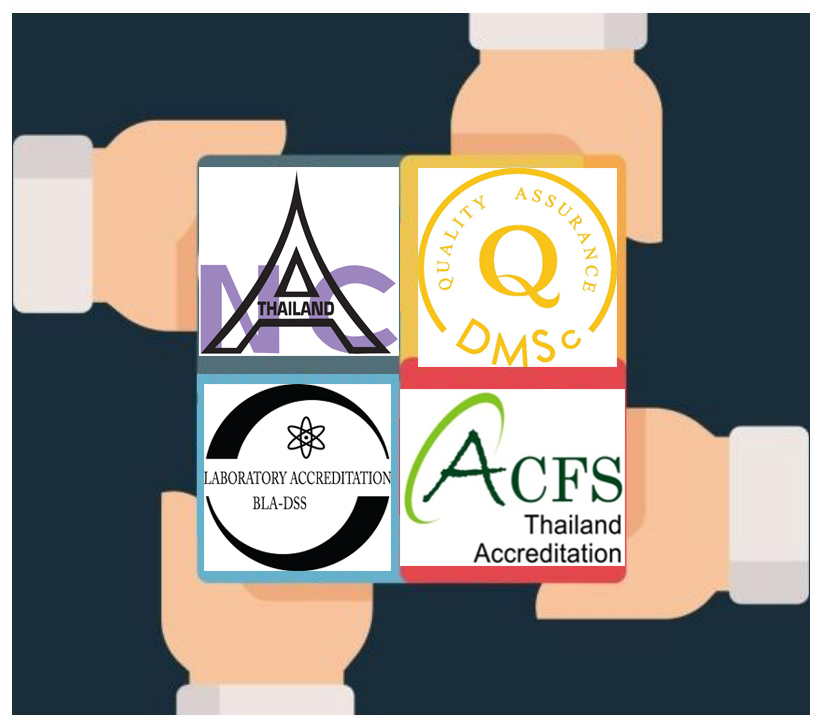

On 28-30 September Minsk, Belarus, hosted The Belarusian Industrial and Innovation Forum 2021 – one of the largest international events in the field of industry, high technology, innovation and scientific and technical development. The purpose of the exhibition is to promote innovative industrial equipment, products and technologies of domestic and foreign companies to regional and international markets and to strengthen business contacts and share best practices.
Within this Forum on September 29, 2021 the Belarusian State Centre for Accreditation held a breakout session covering topical issues of accreditation.
The benefits of international recognition of accreditation for governors, industry, consumers was discussed as well as the value of the ILAC MRA and IAF MLA marks on conformity assessment documents for business and industry. BSCA also took the opportunity to draw more attention to the global data base IAF CertSearch as an international online platform to provide the validation of accredited certification worldwide.
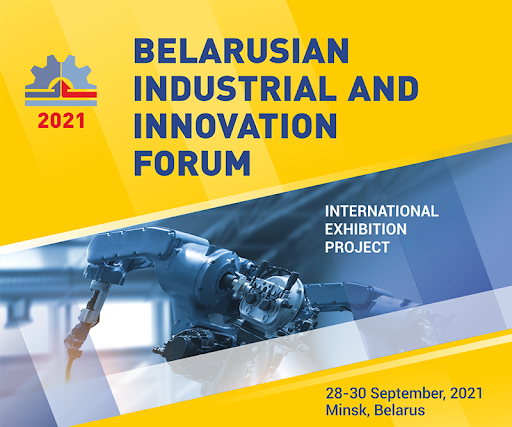
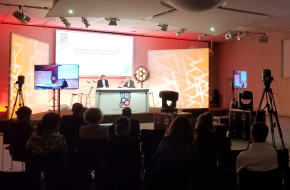
Cofrac* is used to organising events for its customers of its different divisions. Usually offered face-to-face, theses meetings have been reinvented due to the pandemic.
Following two “Accreditation and Inspection meetings” organised in 2016 and 2018, Cofrac offered a completely redesigned event in June 2021, to accredited bodies and those interested in accreditation for inspection activities.
With a studio worthy of a television production and several projectors and cameras pointed at concentrated speakers, flawless animation, discussions, presentations and videos broadcast and available for streaming; the organisation of this event was undoubtedly a great first and success for Cofrac!
Called “Accreditation in the inspection field: let’s talk about it!”, this event took place remotely, filmed and broadcast live from Paris. Only the members of the Inspection division were present on D-day in the studio to encourage their colleagues in this unprecedented exercise.
On the program for this half-day: updates and projects from the division, a presentation of the most frequent findings observed during the assessments as well as a point on the associated requirements, and a focus on the document GEN REF 11 – General rules for reference to accreditation and to international recognition arrangements – which gave some clarification on how to use the reference to accreditation.
The event was punctuated by live surveys, to collect participants’ reactions, and video interludes, one on the Cofrac digitisation project, and a second one explaining the different types of independence in the inspection field.
The organisation of this remote meeting met the expectations of the 142 people who participated via the streaming platform. Indeed, out of the 77 who answered the satisfaction questionnaire, 99% said they were satisfied and very satisfied. When asked “Did you like the TV set format?“, the answer was unanimous: 99% yes! Further proof of the success of this event is that 73% of respondents said they would prefer this remote format for a future event!
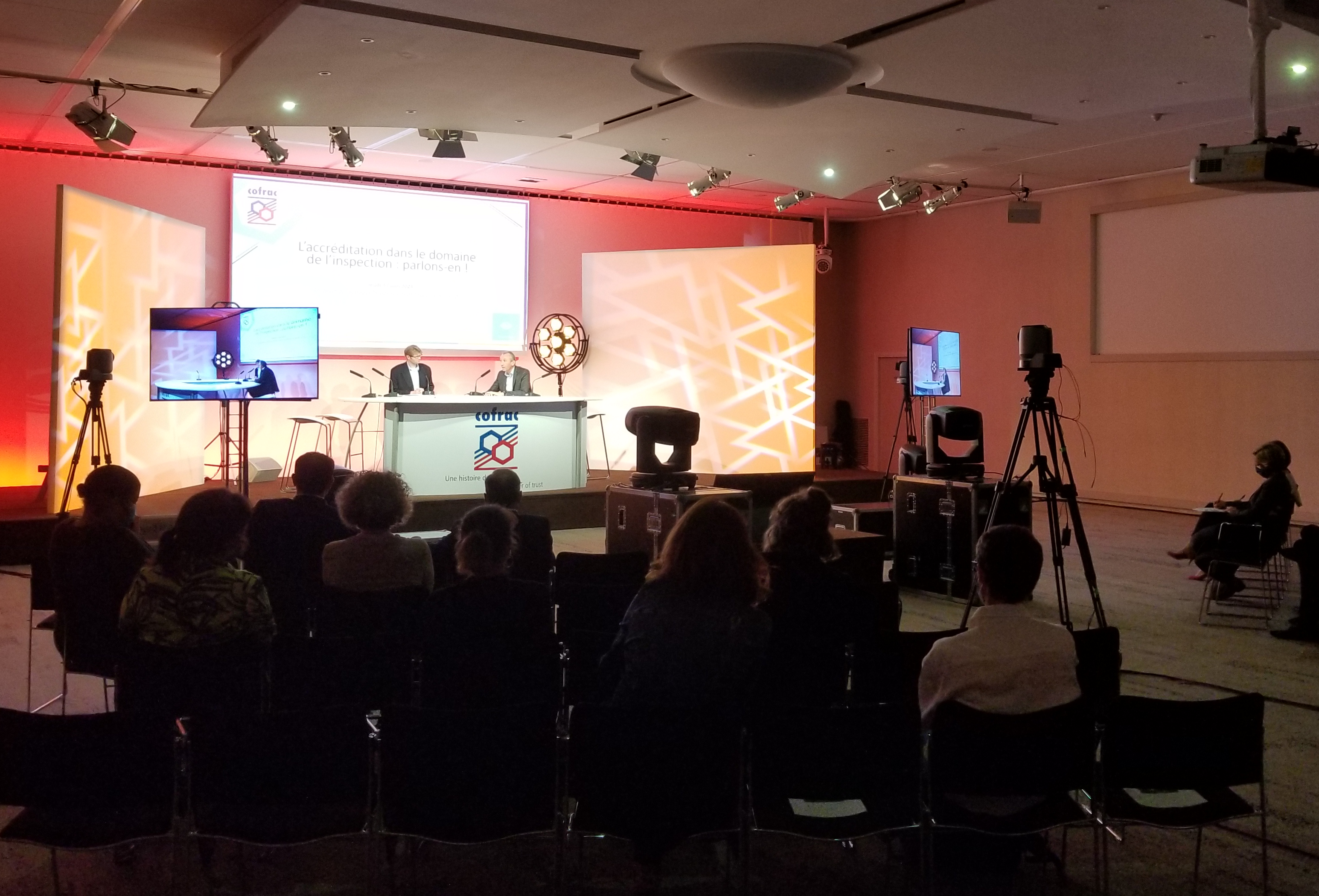
* The French accreditation committee (Cofrac).
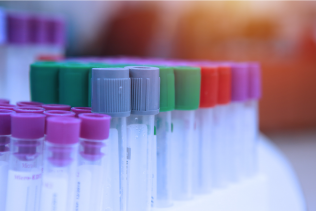
EIAC launched a number of new accreditation schemes:
Crime scene investigations
The Emirates International Accreditation Centre (EIAC) has launched its ISO/IEC 17020:2012 accreditation scheme for inspection of crime scenes. This is a first of its kind in the region. EIAC is already running ISO/IEC 17025 accreditation schemes for forensic and digital forensic testing laboratories. This new accreditation scheme will enhance the confidence in the reliability and accuracy of data produced during criminal investigations.
Medical sample collection centers and laboratories
This scheme is based on ISO/TS 20658: Medical laboratories- Requirements for collection, transport, receipt, and handling of samples and covers the essential and very important aspect of medical testing. Ensuring the integrity of the samples is crucial reliable testing.
Inspection for clean room and biosafety cabinet
This scheme is based on ISO/IEC 17020:2012 and provides reliable tools to ensure the better environmental monitoring.
EIAC accredited first day care surgery center
EIAC has accredited the first Day Care Surgery Centre in the region. The scheme is based on the requirements of the International Society for Quality in Health Care (ISQua). This scheme was developed to address the growing need for quality management in the healthcare sector.
EIAC signed MoU with Dubai Health Authority
EIAC has revived its Memorandum of Understanding (MoU) with Dubai Health Authority (DHA). A delegation from DHA visited the offices of EIAC and the progress on the MoU was reviewed and it was resigned. The DHA is an important stakeholder for EIAC in its accreditation services. DHA has recognized EIAC as one of the accreditation service providers for healthcare sector. The EIAC extended its services to cope with the challenges brought about by the COVID-19 pandemic and accredited conformity assessment bodies for COVID-19 testing and personal protection equipment testing. The EIAC has accredited 168 medical laboratories and one day care surgery center.
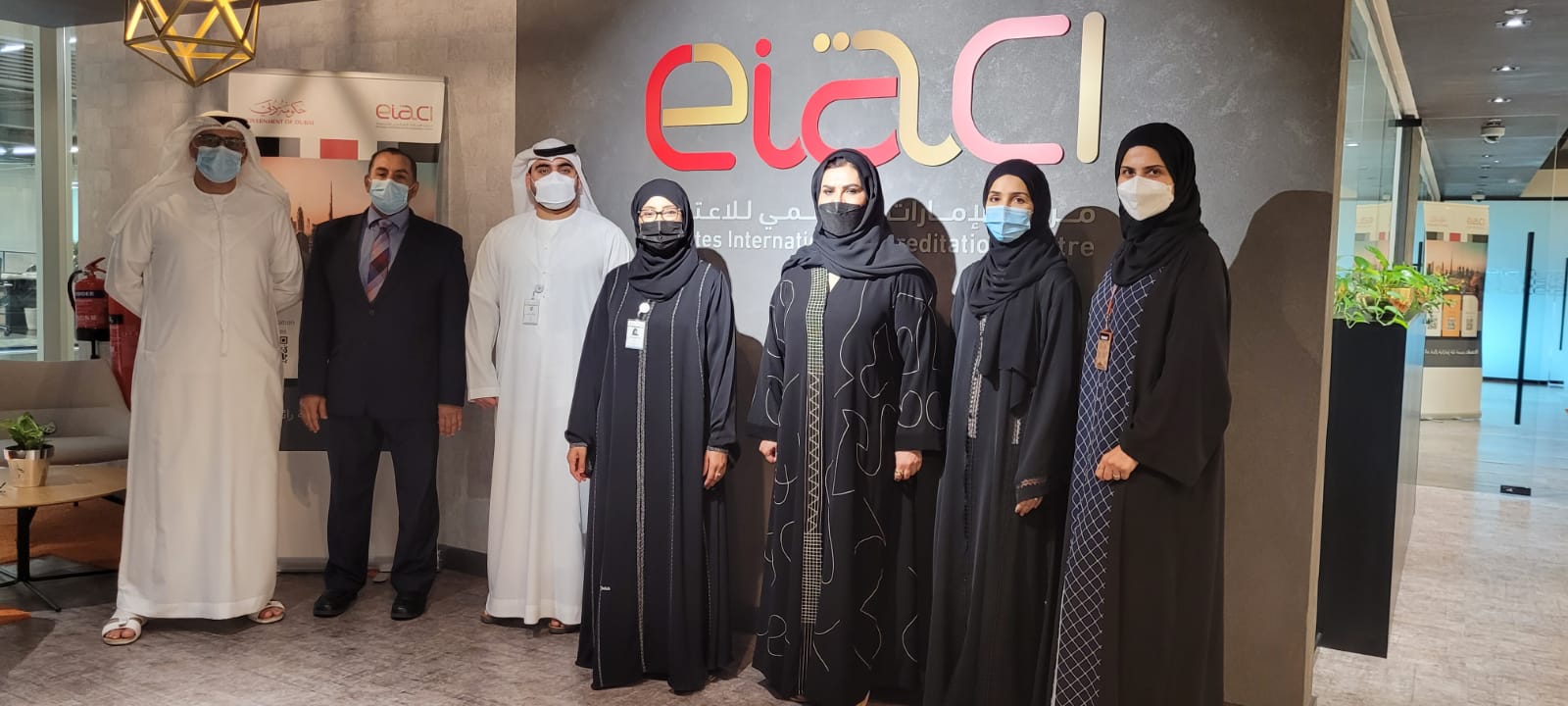
EIAC CEO with visiting DHA delegation
EIAC participating in regional and international events
As a major accreditation body in the region, EIAC actively participates in regional and international activities.
Ms. Amina Ahmed Mohammed, Chief Executive Officer of EIAC, attended the 8th International Halal Food Conference on 1st September 2021. She presented on the “Role of EIAC Accredited Halal Conformity Assessment Bodies in Developing Halal Trade”. Mr. Mohammad Abdelmotagaly, Advisor of EIAC, gave a presentation on the “Approach Towards Harmonizing Halal Standards”.
Ms. Amina Ahmed Mohammed also attended the symposium of Saudi Accreditation Council. The symposium celebrated World Accreditation Day. Ms. Amina spoke on the role of Arab Accreditation Cooperation in the region for supporting the accreditation bodies.
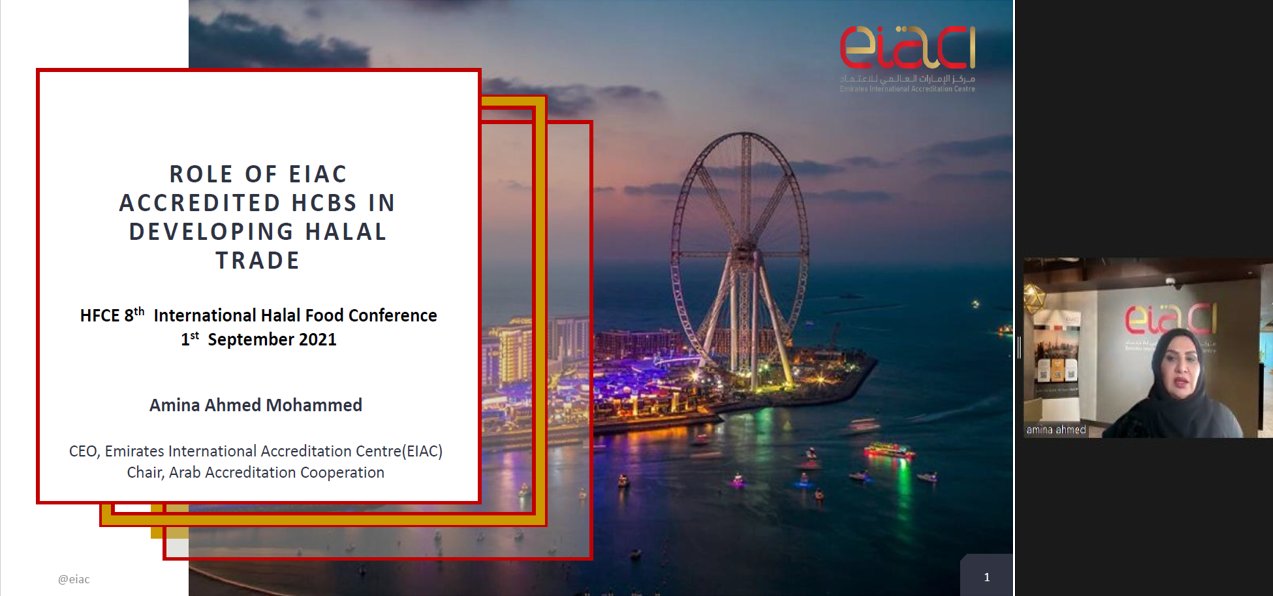
EIAC CEO addressing the International Halal Food Conference
EIAC’s accreditations helping business entities and decision makers
The United Arab Emirates has a strong quality culture. The EIAC is playing a vital role in maintaining the highest levels of quality in various fields. Business entities, and public and private decision makers are widely accepting the accreditation granted by EIAC.
An EIAC accredited inspection body was contracted to inspect all stages of the world’s tallest Ferris wheel known as “Ain Dubai”. It is 250 meters (820 ft) tall and is due to open on 21st October 2021. The EIAC accredited inspection body has certified the whole journey of the Ferris wheel from reviewing the design, to inspecting the manufacturing process and the functionality, and verifying the safety of the wheel post installation.
EIAC Director of Certification Bodies Accreditation Department and the Advisor of EIAC visited Dubai airport and immigration authorities and discussed persons certifications for various fields related to airport and immigration operations.
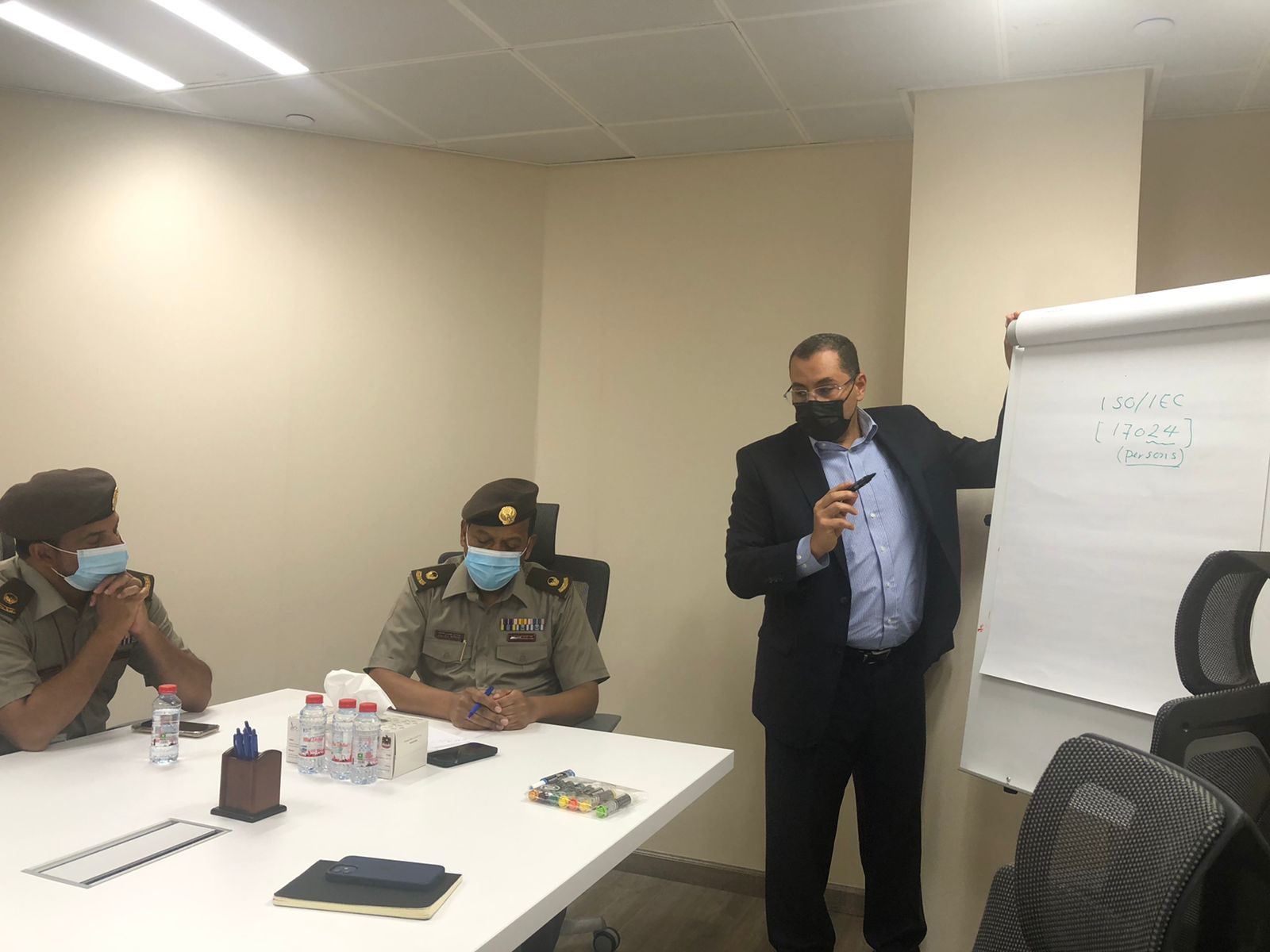
EIAC representative’s briefing to Dubai airport authorities
EIAC’s peer evaluation by ARAC
The periodic peer evaluation of EIAC was conducted on 23-27 May 2021. The scope included ISO/IEC 17025, ISO 15189 and ISO/IEC 17020 for testing, calibration, medical laboratories and inspection bodies, and the evaluation was conducted remotely.
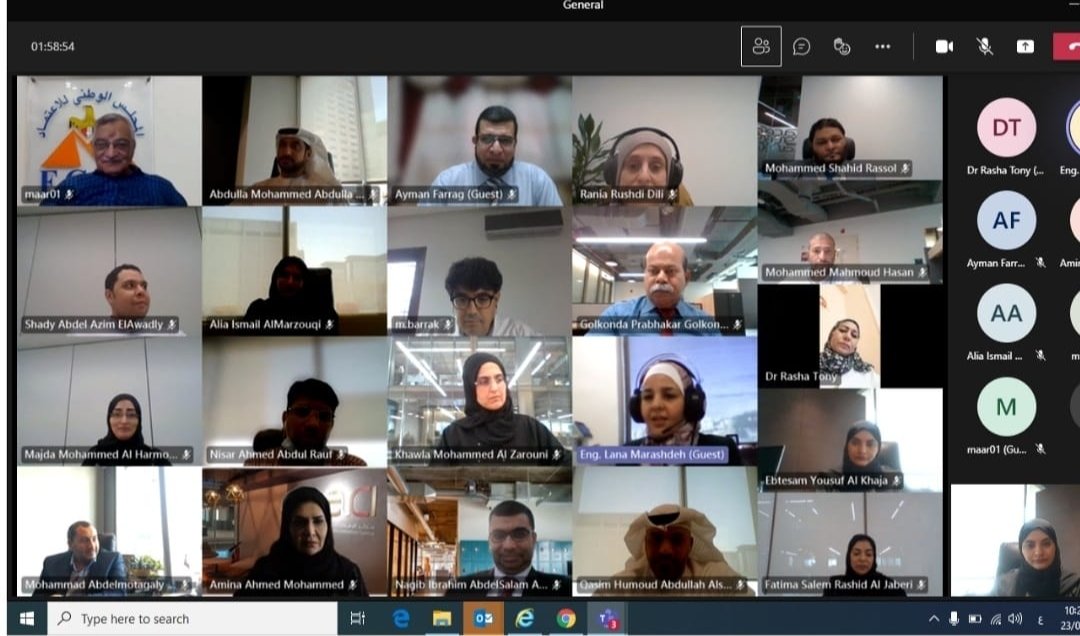
EIAC’s remote peer evaluation

ISRAC: A remote/on-site hybrid for accrediting PCR based COVID-19 molecular detection
The Coronavirus crisis forced ISRAC to adapt quickly. As in all other affected economies, performing an on-site assessment presented a serious health risk to both the laboratory and the assessment staff. The risk was highest when assessing the performance of medical laboratories, especially those seeking accreditation for routine PCR-based COVID-19 detection.
In Israel, there is no regulatory demand for ISO 15189 accreditation. Nevertheless, two laboratories sought accreditation for a kit-based system.
Some of the challenges were instantly apparent. The technical assessor, while having vast knowledge needed to adequately assess the activity, was in a risk group. Furthermore, vaccines were not available.
To solve this challenge, aw remote assessment was used. However, this concept was relatively new. As e could not fully rely on remote tools, as it was unclear how efficient such an assessment can be. For that reason, we developed a risk-based approach to the viability of such an option. Including proper supporting infrastructure, type of assessment, and limitations to conducting observations and interviews properly. The last parameter in this risk-based approach was the presence of an ISRAC representative on-site, as we believed such a presence would lower the risk significantly.
Accordingly, the laboratory representatives assured us beforehand that the Wi-Fi signal is strong in all relevant workspaces and a lead assessor with experience in molecular biology was on site, along with a laptop setup with a remote communication program.
The assessment was certainly adequate, in part thanks to the cooperation of the staff. However, several problems arose. The two main issues revolved around the equipment used for the assessment. The noise in the room made the communication hard. Furthermore, the camera quality prevented the technical assessor from seeing items in a proper resolution, and she often relied on verbal descriptions given by the assessor on site. This dynamic slowed the process significantly, and arguably, without a representative on-site the assessment could not have been carried out adequately.
To improve on this performance, the equipment used at the second laboratory was upgraded and included Speakers, a microphone, and a Go-pro camera. The lab provided a cart that acted as a sort of portable assessment station, moving from one bench to another, and providing the technical assessor with much more information than before. The infrastructure needed was more of a challenge in this case, as the lab is set up underground, and the relevant workspaces were more spaced out. However, clear communication between ISRAC staff, lab management, and the hospital’s IT staff resulted in a clear and strong signal throughout the day. The addition of the go-pro camera allowed for greater flexibility in the visual aspect of the assessment. it was possible, for example, to examine tip positioning in the robot, hard-to-reach calibration stickers, and proper use of equipment inside the biological cabinets. The fact that the same assessors, both the technical and the lead, were the same in both laboratories was also beneficial as even this limited experience with a hybrid assessment made the second one better.
A pandemic made it necessary to come up with a new tool that would allow us to continue with our duties. While unforeseen issues had to be overcome, constant improvement and risk management allowed ISRAC to establish an adequate tool for remote and hybrid assessments. The assessors stayed safe, and all the aspects of the ISO 15189 standard were adequately examined. Hopefully, this new tool will not be put aside even after a global return to normalcy.
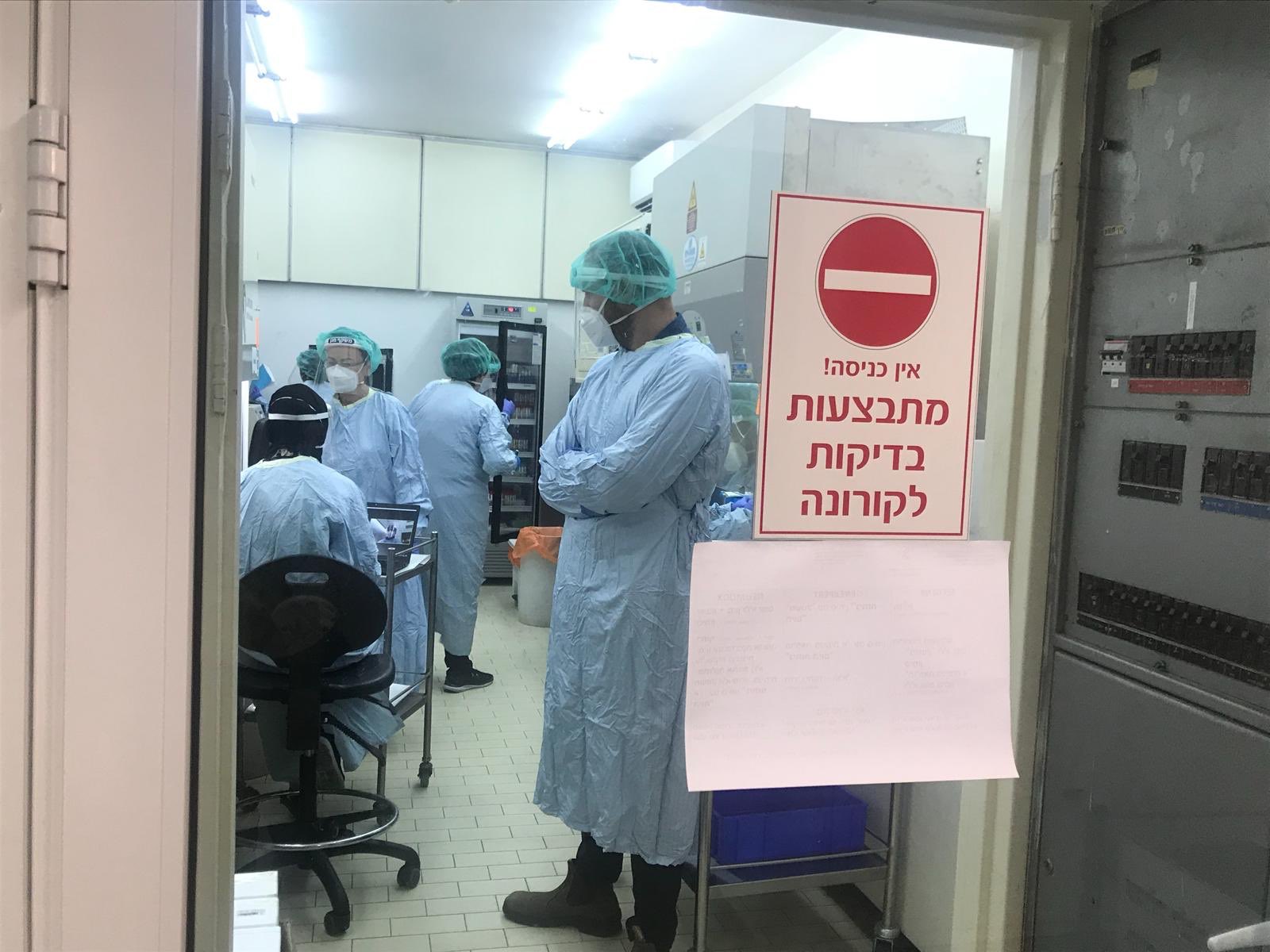

NABL has taken up a unique initiative to promote the services of accredited Proficiency Testing Providers (PTPs) and Reference Material Producers (RMPs) and sensitize laboratories on the available infrastructure and services.
This year 5th PTP/RMP conclave was conducted on 30th – 31st August 2021 by NABL virtually which saw participation from not just the local but the international community including China, Iran, Mexico, Sri Lanka, etc. Chief Guest, Prof. HE Ping, CNAS, APAC PT Chair, provided an update on the revision of ISO/IEC 17043.
The PTP/RMP conclave also saw presentations from PTPs and RMPs on their PT plans and RM productions. The presentations are then judged by NABL experts based on technical aspects, content, presentation time, etc. and prizes were given to the top three PTPs/RMPs of the 11 presentations in the conclave.
For the full article on 5th PTP/RMP conclave please visit the NABL Newsletter August 2021 (Link: https://nabl-india.org/wp-content/uploads/2021/09/NABL-Newsletter-Aug-2021.pdf)
Note:
National Accreditation Board for Testing and Calibration Laboratories (NABL) is a Constituent Board of Quality Council of India (QCI), an autonomous body under Department for Promotion of Industry and Internal Trade (DPIIT), Ministry of Commerce and Industries, Government of India.
NABL is an accreditation body providing accreditation services to CABs:
*CABs accredited as on 30 September 2021
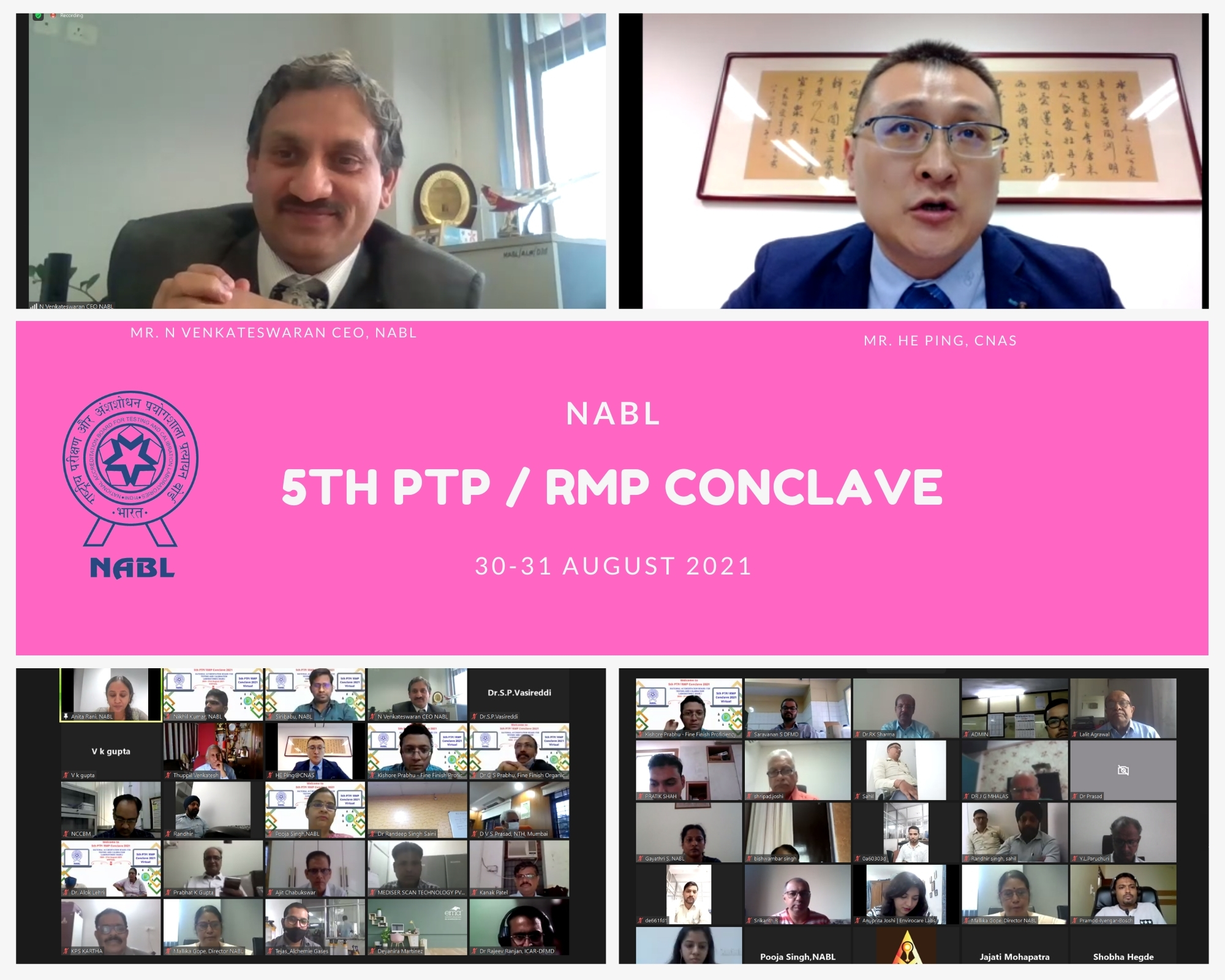
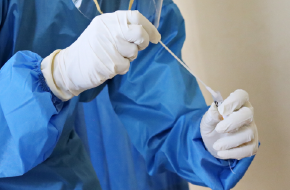
NATA pushes for accredited travel testing for COVID-19 to meet global standards
With Australia’s international borders soon to re-open, NATA has been actively urging the Australian Federal Government, aviation companies and international travel agencies to mandate use of accredited COVID-19 testing organisations and procedures to provide travellers assurance and confidence the tests conform to globally recognised standards.
While vaccination rates are rising around the world, vaccinated persons can still carry COVID so the need for diligent testing for both arriving and departing international travellers will continue to be a focus.
NATA believes that any laboratory performing COVID-19 tests should not only be accredited, but also be recognised under the International Laboratory Accreditation Cooperation (ILAC) framework.
In Australia, NATA has already accredited more than 160 facilities for COVID-19 tests including polymerase chain reaction (PCR) and more recently, Rapid Antigen Testing (RAT).
NATA firmly believes that specifying accreditation for COVID-19 is the only way for regulators to ensure the reliability of tests and to help reduce the impact on health, trade and the Australian economy.
——————–
View NATA CEO, Jennifer Evans, discussing travel testing with the BBC.
View NATA’s official Media Release
For additional information, please contact Brendon.moo@nata.com.au or Liam@commswork.com.au
Why NATA? A new video series
“You can’t be what you can’t see” is often used as a motto to encourage diversity.
NATA, Australia’s leading accreditation authority, is using “they say you can’t be what you can’t see” as a vision to deliver a new video series that brings visibility to the NATA brand and showcases and promotes the benefits of accreditation.
Titled ‘Why NATA?’, the series uses video storytelling to make an emotional connection by highlighting what NATA does and the role it plays in helping consumers, in every aspect of their daily lives – from the water we drink, the food we eat, the houses we live in or the cars we drive.
NATA produced the first episode as a “proof of concept” which you can see https://bit.ly/3pcBWNK
The spot features a family going about their daily routine and highlights how NATA impacts their lives and how standards exist all around them.
NATA is now planning to produce a series of episodes which will touch upon the many industries NATA works with, from agribusiness, animal health, the environment and human pathology, to forensic science and sleep disorders.
For additional information, please contact Brendon.moo@nata.com.au